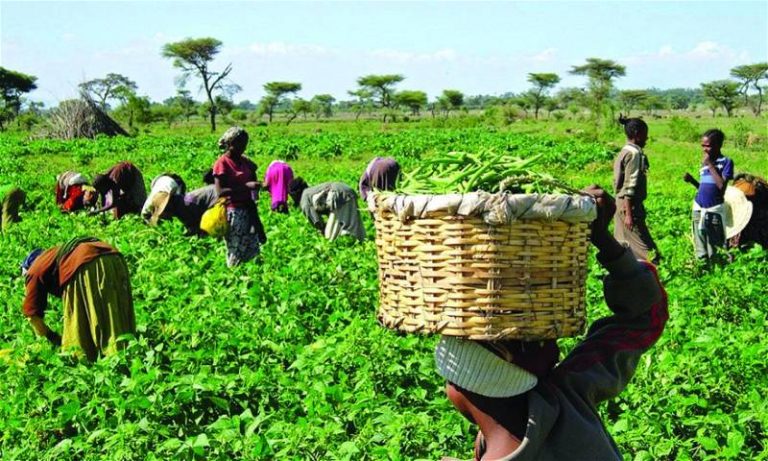The Federal Government, on Monday, said the 2024 dry season farming would create 5-10 million jobs across the country.
It disclosed this at the 30th regular meeting of the National Council on Water Resources and Sanitation organised by the Federal Ministry of Water Resources and Sanitation in Abuja.
Last week, The PUNCH exclusively reported that farmers and agro-dealers were optimistic that the cost of food items could drop in the coming months following the cultivation of about 323,000 hectares of farmlands across the country with the support of the Federal Government.
The report stated that the National Agricultural Growth Scheme and Agro-Pocket Project, January 2024, by the Federal Ministry of Agriculture and Food Security, showed that four major crops: wheat, rice, maize and cassava, were currently being cultivated in large proportions, starting with wheat.
It stated that the document, obtained from the Federal Ministry of Agriculture and Food Security, indicated that the targeted hectares being put into cultivation under the 2023/2024 dry season farming for the various crop value chains were wheat, 123,000 hectares; rice, 150,000 hectares; maize, 30,000 hectares; and cassava, 20,000 hectares.
Commenting on this year’s dry season farming during his address on Monday at the National Council on Water Resources, the Permanent Secretary of the Ministry of Water Resources and Sanisation, Shehu Aliyu, said some programmes had been introduced to ensure the successful implementation of the 2024 dry season farming and create millions of jobs.
He said, “In resolve to align with the state of emergency on food security declaration and the Renewed Hope Agenda of the present administration, I wish to inform you that the ministry has introduced the following three flagship programmes: Water for Expanded Irrigated Agriculture Programme; Partnership for Expanded Irrigation Programme; and River Basin Strategy for Poverty Alleviation.
“The implementation of the above-named programmes has kick-started with the launch of the dry season farming covering a total of 120,000 hectares of land in Jigawa State in November 2023 by the Federal Government in collaboration with Jigawa State under the National Wheat Development Programme.
“In view of the foregoing, some RBDAs (River Basin Development Authorities) have already leveraged on the current intervention to launch dry season farming within the catchment areas.”
According to Aliyu, the remaining RBDAs, which are yet to do so, are encouraged to follow suit.
“The expected outcome from the various interventions is to create five to 10 million jobs for our teeming youths within the agricultural value chain,” he stated.
The permanent secretary further explained that the major components of the declaration of a state of emergency on food security with respect to the water and sanitation sector include the fact that “all matters pertaining to food and water availability and affordability as essential livelihood items be included within the purview of the National Security Council”.
He said there was a need for an urgent synergy between the Federal Ministry of Agriculture and Food Security with the Federal Ministry of Water Resources and Sanitation to ensure adequate irrigation of farmland and to guarantee all year round food production.
He noted that the declaration also required the ministry to “engage our security architecture to protect the farms and the farmers such that farmers can return to the farmlands without fear of being attacked”.
“The 12 River Basin Development Authorities should ensure the planting of crops during the dry season with irrigation schemes that will guarantee continuous farming production all year to stem the seasonal scarcity,” he added.
Also, last week, the Governors of Kwara, Abdulrahman Abdulrazaq; Taraba, Agbu Kefas; Ondo, Lucky Aiyedatiwa; and Kogi, Ahmed Ododo, stormed the Abuja headquarters of the Federal Ministry of Agriculture and Food Security to push for increased crop production to ensure food security in Nigeria.
Abdulrazaq, who doubles as the Chairman of Nigeria Governors Forum, had told the Minister of Agriculture and Food Security, Abubakar Kyari, at the meeting that adequate concentration should be given to food security.
He, however, stressed that the country’s food remained the cheapest in West Africa.
Recall that The PUNCH had reported last week that youths and women of Niger State took to the streets of Minna to protest what they called the biting hardship, the rising cost of food and harsh living condition in the country.
But while speaking on behalf of the governors during the meeting at the agric ministry, Abdulrazaq pointed out that the Anchor Borrowers Programme that was previously implemented by the Central Bank of Nigeria under its former boss, Godwin Emefiele, did not achieve much.
He called on the agric minister to work hard to meet the food targets of the government, as this was vital for the Nigerian masses, adding that state governors would work with the ministry.
“We could not achieve much with the CBN Anchor Borrowers programme, it was very challenging. The issue of food security is a one-stop-shop and we need to concentrate on what we are doing. We need to concentrate on what we are doing for the dry season farming.
“The minister has come up with a programme on cassava, rice and maize and we want to engage in that programme and urgently make sure we improve on our yield and deliver to the Nigerian population.
“We want to get to a stage where we export our food. What we have now is that because of the devaluation of our naira, Nigeria’s food is being exported to West Africa and is the cheapest in the region today,” the Kwara State governor said.
SOURCE: PUNCHNG











